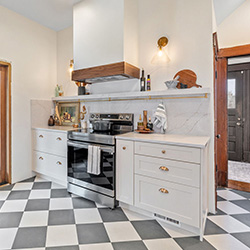There are quite a few different types of countertops and it is important to find the countertop material that works best for you and your family’s living situation. This will be a big decision during your Kitchen Remodel and I want to make sure you have all the information you need to make it the right decision.
Below are some of my favorite type of countertops!
Wood / Butcher Block Countertops
For some, wood and countertops just don’t seem to mix. But a high-quality wood with the right kind of sealer can make for a beautiful, warm and long-lasting countertop. The price varies substantially depending on the type of wood you choose.
Cost: $35 – $85 / sq.ft. installed
Pro:
Unique warm feel
Good price point & looks great in combination with another type of countertop
Con:
Heat sensitive material
More susceptible to dents
Needs to be sealed properly
Solid Surface Countertops
Solid Surface counters are a blend of acrylic or polyester resins, powdered fillers and pigments, cast into slabs. There are many manufacturers of these synthetic counters, including Dupont Corian, LG Hi-Macs, Wilsonart. Its unique composition makes buffing out scratches a breeze and provides the appearance of a seamless installation, including for integral backsplashes. This product outshines its competitors with an ability to be thermoformed into unusual shapes and configurations.
Cost: $40 – $100 / sq.ft. installed
Pro:
Solid surface is durable and nonporous, making it resistant to stains, mildew and bacteria
Comes in almost every color imaginable
Tops are installed seamless due to the material’s ability to be shaped & integrated with each other with heat
Con:
Heat sensitive material
Vulnerable to scratches (Pro: Scratches can be buffed, making your tops look like new)
Granite Countertops
Cost: $45 – $100 / sq.ft. installed
Pro:
Good entry level price points for working with budgets
Resistant to heat and scratching
Con:
Needs to be resealed every 6-12 months depending on fabricator
You will most likely be charged for a full slab unless you find a fabricator that specifies price / sq.ft.
Limestone Countertops
Cost: $50 – $75 / sq.ft. installed
Pro:
resembles marble but more cost effective
Con:
Limestone is a pliable stone, prone to scratching, easily discolored, grazed, or otherwise etched
Develops natural patina (Pro or Con depending if you love it or not)
Porous material needs to be sealed every 6-12 months depending on fabricator to prevent staining
Concrete Countertops
Cost: $70 – $100 / sq.ft. installed
Pro:
Extremely Durable
Very Modern / Industrial Look & Feel
Con:
more expensive and time consuming install
can create hairline cracks after settling
Marble Countertops
Cost: $70 – $100 / sq.ft. installed
Pro:
Classic look that’s always in style
Con:
Soft material, will very easily scratch
Develops natural patina (Pro or Con depending if you love it or not)
Porous material needs to be sealed every 6-12 months depending on fabricator to prevent staining
Soapstone Countertops
Cost: $80 – $100 / sq.ft. installed
Pro:
Very Durable & resistant to heat (even used for wood burning ovens)
High density makes it impenetrable by everything, including bacteria & stains
Con:
softer material, which leads to edges and corners being eased over time
Nicks and scratches may accumulate over time (part of it’s character), the greener the slab the the material
Quartz Countertops
Cost: $95 – $150 / sq.ft. installed
Pro:
Very Durable & resistant to heat
Nonporous material, making it resistant to stains, scratches and bacteria
Comes in almost every color imaginable
Low maintenance
Due to the nonporous composition, available for longer overhangs and fabricators can work with bigger pieces that call for fewer seams
Con:
More expensive and you could be paying for a brand name as well
